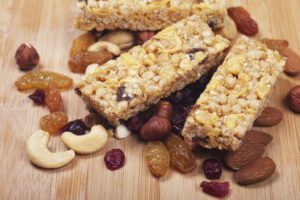Reaching new heights in athletic performance is similar to achieving improved health and general wellness in that it takes time. A process and training routine will need to be discovered and executed repeatedly in order to unlock your full potential. One key ingredient to that process that is commonly overlooked is the energy you fuel your body with.
Our minds tend to wander to our next workout or what we need to change in the gym to see better gains rather than considering how the fuel we use is limiting our growth. There are three important rules to follow in order to optimize energy levels and ensure speedy recovery after training sessions.
1. Balance macronutrients
When it comes to optimizing your performance through proper nutrition, the golden rule is to balance macronutrients. This means to ensure you give your body the right mix of carbohydrates, protein, and fats.
Balance nutrient intake to keep your energy levels up
Carbohydrates: These are the body’s go-to source of energy, particularly during high-intensity workouts. Complex carbohydrates such as whole grains, fruits and vegetables provide a sustained release of energy, perfect for the long haul. For quick energy bursts, incorporating simple carbs from fruits into your pre-workout snack can be incredibly beneficial.
Protein: The role of protein in muscle repair and growth is paramount. To support these essential functions, make sure to include lean protein sources like chicken, turkey, fish, or legumes in your daily diet. This not only helps you recover from the rigors of exercise but also contributes to building a strong, resilient base.
Fats: Healthy fats are often underestimated but play a crucial role in overall health and endurance exercise. They serve as a secondary source of energy, especially during extended workouts. Embrace sources like avocados, nuts, and olive oil in your diet to provide the fuel needed to sustain your performance during endurance training.
2. Properly time fuel consumption
Aim to consume a well-rounded meal approximately 2-3 hours prior to training, incorporating a mix of the aforementioned macronutrients. This will provide you with a sustained release of energy, ensuring you’re adequately fueled for the physical demands ahead. Busy schedules might not always allow for such planning, so, in these cases, opt for a smaller snack containing both carbs and protein. Aim to take in that snack 30 minutes to an hour before your workout to give your body the quick energy boost it needs.
Once training is complete, shift your focus to post-workout nutrition. The 45-60 minutes following a workout is the best time to provide your body with a combination of protein and carbohydrates. Doing so in this window is crucial for muscle recovery and replenishing glycogen stores. Whether it’s a well-balanced meal or a nutrient-packed snack, post-exercise nourishment sets the stage for optimal recovery, helping your muscles repair and preparing you for the next challenge.
Everyone has unique energy needs, and you should listen to your body. Pay close attention to your personal needs and adjust the amount of certain fuels you consume accordingly. Some individuals, for example, may find that increasing carbohydrate intake before, during, or after exercise enhances their performance, while others may have different preferences. Being attentive to your body’s signals will help you tailor nutrition to suit your specific requirements, maximizing your energy and the gains to be had from your training.
3. Stay hydrated
As it pertains to athletic nutrition, one of the most important factors is proper hydration. It serves as a anchor for optimal performance, aids in digestion, and regulates body temperature during intense physical activity. Maintaining adequate hydration isn’t just a matter of sipping water—it’s a strategic practice.
Getting and staying hydrated before, during, and after workouts is essential. Neglecting your hydration can have profound effects on energy levels and overall well-being. Consider exploring the best types of fluids for efficient rehydration, recognizing the individualized nature of fluid needs. Factors such as climate, exercise intensity, and personal sweat rates contribute to a unique hydration blueprint for every athlete.

With our 100% money-back guarantee and vetted coaches, anyone can achieve their full athletic potential. CoachUp is the safest and easiest way to find a coach for personalized training. Find your perfect coach today and become the athlete you want to be!
How useful was this post?
Click on a star to rate it!
Average rating 5 / 5. Vote count: 3
No votes so far! Be the first to rate this post.



